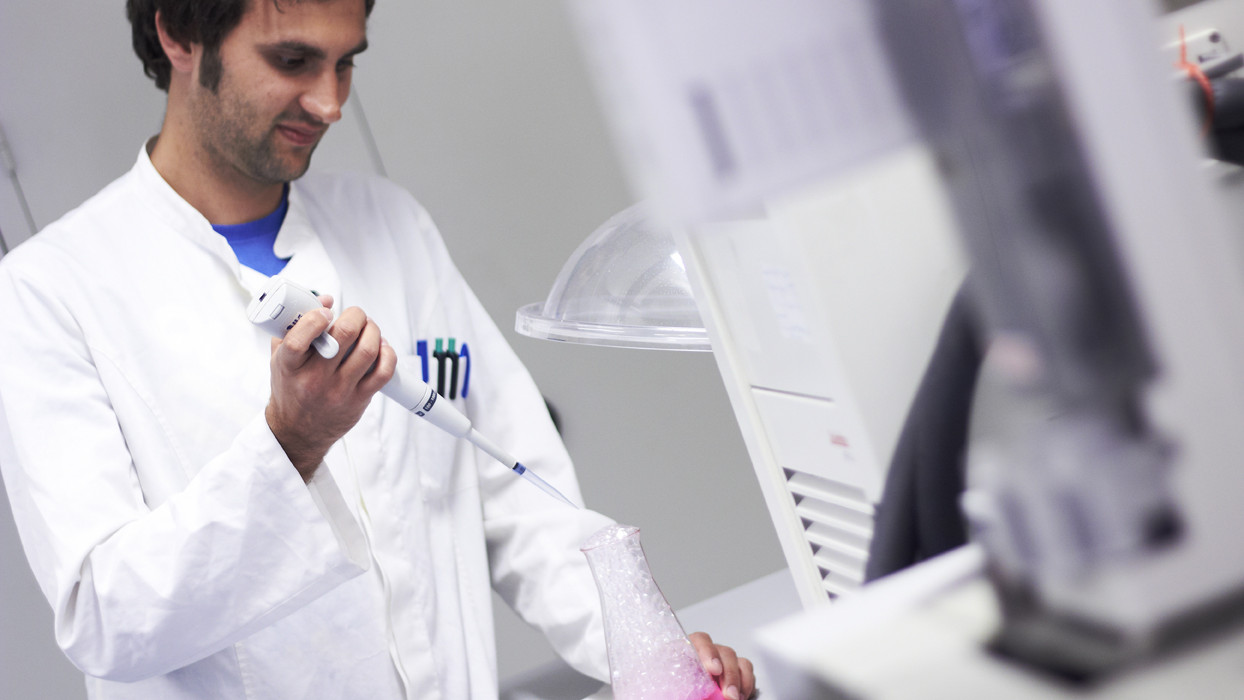Chemistry as subject in the Master’s Teacher Training Course for Grammar Schools
(Master of Education)
Profile
German HZB: none
International application: German C1
Find out more
A school internship and a further internship (in a company, a social institution, a sports club, etc.) for at least four weeks must have been completed (compulsory).
Stay abroad possible, but not obligatory.
Short Description
The subject Chemistry is offered as one of two subjects within the Master’s Teacher Training Course for Grammar Schools.
Chemistry is life! Chemistry is a dynamic, exciting subject. Chemistry is everywhere around us – from the production of new materials to understanding biological systems, from the food we eat to the medication that keeps us healthy, from the quality of our drinking water to keeping the air we breathe clean.
The Master’s Teacher Training programme for Grammar Schools primarily trains future teachers who want to teach this exciting subject in a professionally competent and motivated manner. In addition to the sound education in the classical subjects of chemistry, the subject didactics of chemistry takes a wide space and provides a good insight into all facets of "teaching and learning" for the subject of chemistry.
In particular, major challenges such as heterogeneous learning groups or digitally supported learning are addressed.
Course Content
- Inorganic chemistry
- Organic chemistry
- Physical chemistry
The two subjects taken previously on the two-subject Bachelor’s degree programme are continued: students earn 20 CP in the first subject and 45 CP in the second subject. By the time they have completed the Master’s degree, graduates will have studied both subjects to the same level in the course of the Bachelor’s and Master’s degree programmes. In addition to their teaching subjects, students also earn 30 CP in Education Sciences. The degree programme concludes with a Master’s thesis worth 25 CP. Students can choose to write their Master’s thesis in the first or second subject, or in Education Sciences. Students undertake five weeks of practical training in each of their two teaching subjects, which involves taking on teaching duties at a school. Students who choose English and Spanish as their teaching subjects must spend a three-month study-relevant period abroad. In some subjects, students must provide evidence of language proficiency. For more information about such requirements and the course sequence for specific subjects, see the Examination Regulations for the degree programme.
Teachers should enjoy interacting with children and young people. Furthermore, it should be taken into consideration that teaching staff must also interact with parents, education experts from other institutions and a large number of teacher colleagues. Of course, it is also important that students are interested in their chosen subjects, enabling them to get their pupils enthusiastic about the subjects. Multidisciplinary skills such as knowledge transfer are also required.
The Master’s degree in the Teacher Training Course for Grammar Schools entitles graduates to enter the preparatory phase of teacher training for grammar schools in Lower Saxony for both subjects taken. It is generally possible for graduates to change to a different federal state for their preparatory phase of teacher training; a test is taken on a case-by-case basis in consultation with the relevant local educational authorities. Graduates may also embark on an academic career by taking a doctorate. They also have the possibility to work in a non-school-based area in the subjects taken.
Admission Requirements
An undergraduate degree in a related field of study, such as
For master's degree programmes with unrestricted admission, all applicants who fulfil the admission requirements will be admitted a university place. The exact admission requirements can be found in the admission regulations:
Application Deadlines
First-year students (application from non-EU countries: VPD from uni-assist is required)
- 1 June – 15 July of the year for the winter semester
- 1 December – 15 January of the year for the summer semester, only when there are vacant capacities
Students resuming their studies and transfer students (application in a higher semester)
- 1 June – 15 July of the year for the winter semester
- 1 December – 15 January of the year for the summer semester
Do you have questions about studying? We are happy to help!

30167 Hannover

30167 Hannover









